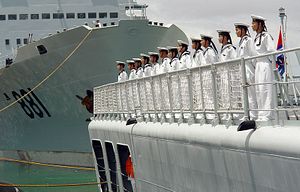Call it the Hermit Fleet. China’s navy evidently missed the part of Naval Diplomacy 101 that describes diplomacy as a mode of human interaction. No personal contact, no diplomacy. And no diplomacy means few international agreements, gains in soft power, or other good things.
The PLA Navy’s appearance at Australia’s International Fleet Review was perfunctory at best. The point, apparently, was to show off the destroyer Qingdao. Or, more accurately, to show off the ship’s exterior surfaces. By most accounts — I didn’t get to view the fleet until (harumph, harumph) a VIP harbor cruise Sunday afternoon, after the destroyer left port — she fared well in that department. Qingdao appeared tidy, rust-free and generally in shipshape. Any mariner will tell you such basics are a sign of professionalism.
But outward appearances are only part of diplomatic interchange — and not the most important part. The PLA Navy ran a severe deficit in human interaction. Crewmen were restricted to the ship for their entire, all-too-brief sojourn in port. Unlike other foreign vessels, Qingdao hosted no visitors. After arriving on Friday, with the other national contingents, she left port Sunday morning, scant hours after Saturday night’s gala fireworks. (Maybe the skipper just wanted to glimpse Prince Harry, who was on hand for the spectacle, and who also skedaddled early.) The rest of the impromptu fleet remained in port all week. Needless to say, the PLA Navy went unrepresented at the Sea Power Conference — a conference devoted, ironically, to exploring the potential for naval diplomacy in Asia — that convened Monday as part of the fleet review. Nor did Chinese sailors take part in Wednesday’s closing parade down George Street, Sydney’s central boulevard. Etc.
While we make much of the rise of China, this is not the behavior of an aspirant to regional leadership. It betrays a shortfall in self-confidence. Confident navies exude confidence. They’re unafraid to show off ships, aircraft and hardware. They also trust officers and crewmen to act as the public face of the service, and of the nation. And indeed, sailors from countries not named China mingled freely with the local citizenry — and did themselves credit in doing so. Press reports about social interactions were uniformly upbeat, as were my firsthand impressions from hours spent pounding the pavement (and not, mind you, consuming a drop of that execrable Australian wine or brew). In short, Beijing flubbed an opportunity to refurbish an image battered over the past few years — or rather, self-battered — through bellicose actions in the China seas. Instead its conduct left the impression that the navy was jittery about what officers or sailors might do if granted liberty to traipse the streets of Sydney unsupervised.
That’s not just fearful but self-defeating behavior. It damaged China’s standing with fellow seagoing powers. Better to stay home than show up and act churlishly or diffidently. Woody Allen says showing up is 80 percent of life. The great Woody is only half-right in this case. Showing up is important. But what you do once there matters.
Back to diplomatic finishing school, Hermit Fleet.

































